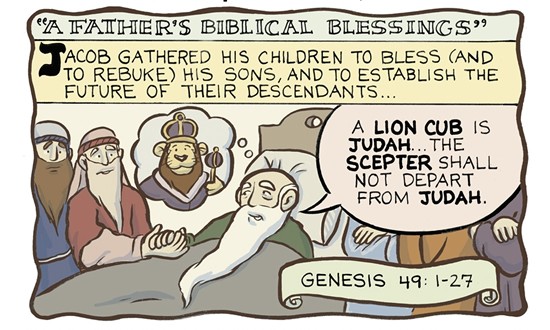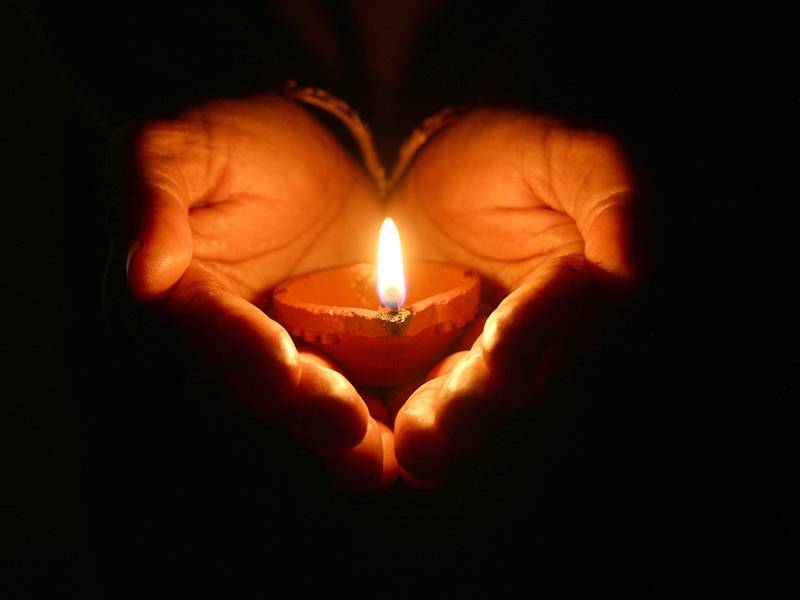Bonjour / Hello [nickname_else_first_name],
Table of contents
1) Perashat Hashavoua - Rabbi Eli Mansour
2) Halakhat Hashavoua (Halakhot related to day to day life) By Hazzan David Azerad -
The Meaning Behind the Blessing of the Moon -Peninei Halacha
3) Holy Jokes!
4) For KIDS

This Week's Parasha Insight with Rabbi Eli Mansour
Parashat Vayehi: Learning and Performing
We read in Parashat Vayehi of the blessings Yaakov Abinu conferred upon Yosef’s two sons, Efrayim and Menashe. Yosef brought his sons to Yaakob, positioning the older son, Menashe, to Yaakob’s right, figuring that Yaakob would place his right hand over Menashe’s head while giving the blessing, symbolizing his status of prominence as the firstborn. Yaakob, however, crossed his hands, placing his right hand on the hand of the younger brother, Efrayim, and placing his left hand on the older son, Menashe. Yosef began lifting Yaakob’s hands in order to rearrange them, but Yaakob refused, insisting that the hands were placed correctly.
What is the meaning behind this "argument" between Yaakob and Yosef, and what lesson does it convey?
Torah life requires two general commitments: learning, and performing. We are to make time to study Torah, and we must also put the laws and values we learn into practice, by observing all the Misvot. The Talmud Yerushalmi comments that if one only learns Torah, without any intention of practicing what he learns, then it would have been preferable for him to have died at childbirth. The explanation of this comment is that, as our Sages teach us elsewhere, a fetus studies the Torah with an angel when it is in the womb. A person does not need to come into this world to learn Torah; he does that already before he is born. We are brought into this world so we can not only learn, but also perform the Misvot. And thus if a person learns Torah without intending to observe it, there was no need for him to exit the womb, as the entire purpose of entering this world is for us to practice the Torah, in addition to studying it.
The Gemara in Masechet Kiddushin (40) tells that the Rabbis convened to address the fundamental question of which of these two lifelong pursuits is greater: studying, or performing. The conclusion, the Gemara says, was that "learning is greater, because learning brings one to perform." Since learning is indispensable for performing the Misvot – after all, one cannot know how to perform the Misvot without learning about them – learning is considered greater. The clear implication of the Gemara’s comment, as the commentators have noted, is that fundamentally, performing the Misvot is greater than learning, but in practice, learning must come first, as learning is an indispensable prerequisite for performing. As mentioned earlier, we have come into this world for the sake of practicing the Torah; this is the objective. In terms of sequence, however, we must first allocate time for learning, for otherwise we will be unable to perform.
With this background, we can understand the different perspectives of Yaakob and Yosef. Our Sages tell us that Menashe helped Yosef manage his affairs as the Egyptian vizier. Menashe was a man of action, working alongside his father in governing Egypt. Efrayim, meanwhile, was a scholar, devoted to Torah study, who learned together with his grandfather, Yaakob, after Yaakob came to live in Egypt. Yosef felt that Yaakob’s right hand, symbolizing primacy, should be placed upon Menashe. As our goal and objective must be performing Misvot and getting involved to help the world, Menashe, the symbol of action, should be shown priority. Yaakob, however, wanted to emphasize that as a matter of practical sequence, Efrayim – the symbol of learning – must precede Menashe. While it is true that action fundamentally is of greater importance than learning, we must give learning primacy when arranging our priorities, as it is a necessary prerequisite for performing the Misvot.
After proclaiming the blessings, Yaakob informed Yosef that future generations of Jews would bless their children by wishing them, "Hashem shall make you like Efrayim and Menashe," placing Efrayim before Menashe. Yaakob here established that when parents educate their children, they must give precedence to "Efrayim," to study, as it is only through study that their children can achieve the end goal, which is "Menashe" – action.
This insight underscores the vital importance of setting aside time for serious engagement in Torah study, and also teaches us the proper mindset with which we must approach our study. The ultimate purpose of study is "Ma’aseh," to apply what we learn. We are to approach learning with an open mind, understanding that we are going to encounter concepts with which we had been unfamiliar, and which we will then have to apply to our lives. Part of the process of learning is the commitment to make the life changes that are necessary to put our newfound knowledge into practice. When we study with this mindset, we then fulfill Yaakob’s blessing, and live up to his ideal of combining "Efrayim" and "Menashe" – study with observance.

Halachot this week are selected and Translated by Hazzan David Azerad
The Meaning Behind the Blessing of the Moon
-Peninei Halacha
In the Blessing of the Moon (Birkat HaLevanah), we thank Hashem for creating the moon, and for the benefit we receive from its light. Many attach special honor to this blessing, because it alludes to deep concepts concerning the Jewish people. We will explain some of these ideas:
Of all the heavenly bodies, the moon is most similar to us. Just as a person’s life is filled with ups and downs, so too, the moon waxes and wanes. In the middle of the month, it looks full, but as it nears the end of the month it dwindles and disappears. And just as Adam paid dearly for giving in to his pride and desires when he ate from the Tree of Knowledge , so too, the moon was not satisfied with being originally the same size as the sun, wanting instead to rule over it. In retribution for the moon’s arrogance, HaKadosh Baruch Hu reduced its light and created the lunar cycle in which its light decreases every month, eventually disappearing from the sky. However, unlike man, who fades away and dies, the moon is part of the heavenly hosts and is fixed and everlasting, always regenerating itself. The Jewish people have the exact same qualities. On the one hand, they lead normal human lives, which include ups and downs, with good inclinations as well as evil ones. Yet their connection to faith and God is everlasting. Therefore, unlike other nations, Am Yisrael endures forever. Thus we are reminded of Israel’s immortality in Birkat HaLevanah, when we see the moon reappear and grow stronger every month.
Moreover, not only do we manage to survive despite all the hardships, we actually advance to a higher level as a result of each crisis and setback. King David, whose kingdom is compared to the moon, taught us how to transform each setback into an impetus for greater growth. Chazal tell us that David was the least esteemed of his brothers, growing up in the fields amongst the sheep, but he matured and developed from every experience. Even after his difficult fall in the episode of Bat-Sheva, he didn’t give in to despair. Rather, he repented completely, to the point where Chazal say that “he established the yoke of repentance” (Mo’ed Kattan 16b). David transformed the regrettable incident into a catapult of tremendous self-improvement, setting an example for all generations. We learn from him the ways of repentance and its power of renewal. By virtue of his repentance, David’s kingdom is everlasting, just like the moon which always rejuvenates after its decline.
This is why we say in the Kiddush Levanah ceremony, “David, King of Israel, lives and endures.” Likewise, the Jewish people, as well, grow from every setback, rectifying all their sins and blemishes, until they will eventually be privileged to perfect the world through God’s sovereignty. At that time, the moon, which symbolizes our situation in the world, will also return to its perfected state, when its light will be as bright as the sun’s. Thus, we beseech God in Birkat HaLevanah, “It (the moon) should renew itself like a crown of glory for those borne from the womb (the people of Israel), who will eventually renew themselves like it and glorify their Maker for the sake of His glorious kingdom.”
Some have a custom to add the following request: “May it be Your will, Lord my God and God of my forefathers, to repair the moon’s defect, that there be no deficiency in it. Let the light of the moon be like the light of the sun and like the light of the seven days of Creation, as it was before it was reduced, as it says, ‘The two great luminaries’(Bereshit, 1:16). And may the following verse be fulfilled through us: ‘They shall seek the Lord their God and David their king’(Hoshea, 3:5). Amen.
Bevirkat Shabbat Shalom Umevorach
David Azerad
3) HOLY JoKeS!!
Selection of funny snippets, loosely related to this weeks parashah or current events, to brighten your day



4) FOR KIDS
Click on the image to open the youtube video








 MABROOK!!!
MABROOK!!!






